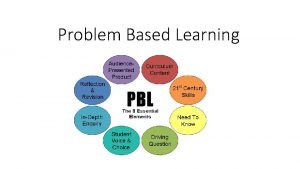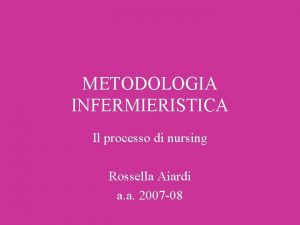PROBLEM SOLVING What is problem solving Problem solving

PROBLEM SOLVING What is problem solving? Problem solving is a different way to develop skills of thinking and reasoning.

Chilos knowledge is important for problem solving Problem solving activities promote: • Knowledge • Skills • Attitudes

Children’s Knowledge is important for adults too they can see how children approach problems and how they learn from that proccess. Problem solving promotes group or common works.

What is a problem? In a problem there are some elements like: givens: the initial condition obstacles gaolas: objective, targets or desired ends. With the world problem we can indicate a lot of things. A problem has not only one solution because there a lot of ways to solve it. Teachers do not present real problems because they adopt closed problems (with a single answer).

There is a large variety of problems: puzzle problems = they are important to look problems from different prospectives. word puzzles = They can be divided in 5 categories § Realistic § Tangible § Contextual § Abstract

Problem solving goes on at an unconscious level because we do not pay attention to the way we do things. We learn principles to apply in different problems and this is the ability to generalise skills into a real life situation.

Understanding problems This is an important point because Children need to express the problem in their own terms. Planning a course of action is important for children to became autonomous.

Adults’ help They help to: § § § consider all factors think of a similar problem simplify the problem model the problem record the plan PS strategies § describing what the child is doing, § asking what she/he is doing § supporting the process

Reviewing the situation is an important process. is made at the end of the work helps children to see the connections between problems, the plan and the solution. Recall time: is better if the recall time is not done immediately but after a period of time.

Success in PS Attitudes, cognitive ability, experience are part of PS Teachers’ work to make children confident with their ability.

Cognitive ability includes: § knowledge § memory § metacognition PS is based on knowledge it requires “know-how” (knowledge requires memory) Most problems are solved by memory

Memory 1). information is analysed with short term memory 2). Is passed in the long term memory. We have: § § § episodic or event memory (for images) visual and auditory memory kinaesthatic memory that is unconscious

Different strategies to access to memory Adults more efficient process to do it because they have more experience than children. Concepts and actions are remembered because the brain makes connections between new and old information. Repetition used to improve our memory.

People can remember things with different processes. § relating new information with what they already know § dividing information § by repetition § by elaboration § forming images

Is experience important to solve new problems? Yes, because it is necessary to transfer skills from one context to another.

PROBLEM PRESENTATION The way a problem is presented plays a relevant role in the ability of the child to understand relate it to previous experience. The presentation of problems has to be simple and clear.
- Slides: 16































